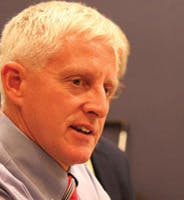When I hear people refer to a "Talent Shortage" in Supply Chain & Logistics, what exactly are they referring to? Also what is the definition of "Talent Shortage" - Does it mean you are unable to find qualified candidates for a position regardless of the wages being offered or as I like to put it "Cannot find a skilled employee at a lower wage"?
EXPERT ANSWERS:When I first entered the business world with an MBA in Logistics in 1975, there were probably no more than 100 undergraduate and graduate students annually entering the commercial world with concentrations in materials management/logistics/distribution, all the predecessors of SCM. Four 4-year
colleges generated the majority of SCM graduates: Penn State, Michigan State, Ohio State and Indiana (my school). Note that of the 11 MBA students concentrated in Logistics at Indiana, 8 were career USAF officers from Wright Patterson Air Force base, or only 3 of us were entering the commercial world.
GDP, the primary driver of SCM activities, has tripled since 1975, but undergraduates and graduate SCM programs have exploded. There are now 44 universities offering undergraduate/graduate programs
(http://www.educationnews.org/career-index/supply-chain-management-schools/) graduating 2,000 students per year or an estimated 20-fold+ increase in SCM trained professionals entering the workforce since 1975.
So, there are a lot more SCM professionals in the workforce today than ever before, and coupled with far superior software/communication tools that are employed in SCM processes, one would believe that there would be plenty of SCM professionals to provide the resources required to make SCM processes more efficient and effective.
So, in conclusion, my belief is that there are plenty of people with the right SCM skills out there, but those invested in clamoring for lots more people in the SCM professions are wrong in their beliefs.
This reminds me of the so-called engineering professional “shortage.” Today less than 5% of engineering graduates are actually employed in the design of products, most do lots of other things, including non-engineering work that they have chosen to pursue. Think about an engineer doing work in 1975; blueprints, slide-rules, hard prototypes and much more time-intensive work. Today one engineer can do the work of 10 engineers of 1975; CAD, high speed computer simulations, 3-D printing and much more. So do we have enough engineers? Of course we do.
Founder
Collaborative Energizer LLC
There are not enough experienced individuals in SCM, either via the educational route
or hands-on experience. There are universities that are offering SCM programs, by professors, who are merely using material found on the web. This is doing a disservice to the students and the industry.
Supply chain and logistics operations and management are a major component of almost all firms, large and small. However, there remain relatively few universities and colleges that offer formal training in supply chain and logistics. In contrast, other major components of corporations such as accounting, finance and marketing are also standard educational programs that almost all universities offer. Thus, supply chain management remains a field where there are relatively fewer “academic suppliers” of talent than there are “academic suppliers” for many other major corporate functions. Clearly, academic training is just one part of the talent development equation, however, it certainly factors into the supply and demand relationship for supply chain talent.
Retired Marine Colonel
Logistics specialist
President PWG Distribution Solutions, LLC.
The original question does beg clarification as at what level is there a talent shortage? It's similar to clarifying, "How much does a car cost?" “What size car?” “Luxury or economy?” “Maserati or Ford Focus?” Our "micro level" focus in Hampton Roads, VA, has been on entry level workers needed in distribution centers and follow-on career opportunities to move to supervisory positions. Many of these positions will have to be filled with personnel trained locally. A person doesn't head to a university or institute in the Midwest seeking skills to work on the floor of a distribution center in Norfolk, VA.
A solution is regional or local training programs conducted by community colleges or institutes like Jim Shephard's training systems. They are the workforce developers. Accomplish the training in less than 30 and get the person employed. The problem for employers is not every region has training programs providing trained and screened people employers need for their distribution centers. In our region, we have a shortfall.”








